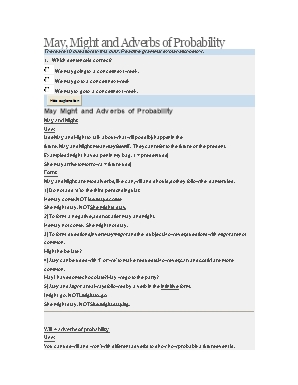Ngữ pháp môn Tiếng Anh Lớp 10 - May, Might anh Adverbs of Probability
Bạn đang xem tài liệu "Ngữ pháp môn Tiếng Anh Lớp 10 - May, Might anh Adverbs of Probability", để tải tài liệu gốc về máy bạn click vào nút DOWNLOAD ở trên

May, Might and Adverbs of Probability There are 10 questions in this quiz. Read the grammar explanation below. 1. Which sentence is correct? Top of Form We may going to a concert next week. We may go to a concert next week We may to go to a concert next week. Bottom of Form May Might and Adverbs of Probability May and Might Use: Use May and Might to talk about what will possibly happen in the future. May and Might meanmaybe will. They can refer to the future or the present. Examples: I might have a pen in my bag. ( = present use) She may arrive tomorrow. ( = future use) Form: May and Might are modal verbs, like can, will and should, so they follow the same rules. 1) Do not add ‘s’ to the third person singular. He may come. NOT He mays come. She might stay. NOT She mights stay. 2) To form a negative, add not after may and might. He may not come. She might not stay. 3) To form questions, invert may/might and the subject. However, questions with might are not common. Might he be late? 4) May can be used with ‘I’ or ‘we’ to make requests. However, can and could are more common. May I have some chocolate? May we go to the party? 5) May and Might are always followed by a verb in the infinitive form. I might go. NOT I might to go. She might stay. NOT She might staying. Will + adverbs of probability Use: You can use will and won’t with different adverbs to show how probable a future event is. I’ll possibly go to the party. I’ll probably go to the party. I’ll definitely go to the party. I’ll certainly go to the party. Form: Note that will / ‘ll is used before the adverb, but won’t is used after the adverb. I’ll probably see you later. I probably won’t see you later.
Tài liệu đính kèm:
 May, might,....doc
May, might,....doc





